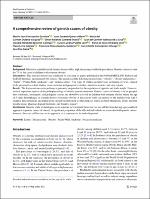| dc.contributor.author | Concepción Zavaleta, Marcio José | |
| dc.contributor.author | Quiroz-Aldave, Juan Eduardo | |
| dc.contributor.author | Durand-Vásquez, María del Carmen | |
| dc.contributor.author | Gamarra Osorio, Elman Rolando | |
| dc.contributor.author | Valencia de la Cruz, Juan del Carmen | |
| dc.contributor.author | Barrueto-Callirgos, Claudia Mercedes | |
| dc.contributor.author | Puelles-León, Susan Luciana | |
| dc.contributor.author | Alvarado-León, Elena de Jesús | |
| dc.contributor.author | Leiva-Cabrera, Frans | |
| dc.contributor.author | Zavaleta-Gutiérrez, Francisca Elena | |
| dc.contributor.author | Concepción-Urteaga, Luis Alberto | |
| dc.contributor.author | Paz-Ibarra, José | |
| dc.date.accessioned | 2023-12-14T14:47:16Z | |
| dc.date.available | 2023-12-14T14:47:16Z | |
| dc.date.issued | 2023-09-19 | |
| dc.identifier.citation | World Journal of Pediatrics. 2023 | es_PE |
| dc.identifier.uri | https://hdl.handle.net/20.500.12959/4704 | |
| dc.description.abstract | Background Obesity is a multifactorial chronic disease with a high, increasing worldwide prevalence. Genetic causes account
for 7% of the cases in children with extreme obesity.
Data sources This narrative review was conducted by searching for papers published in the PubMed/MEDLINE, Embase and
SciELO databases and included 161 articles. The search used the following search terms: “obesity”, “obesity and genetics”,
“leptin”, “Prader-Willi syndrome”, and “melanocortins”. The types of studies included were systematic reviews, clinical
trials, prospective cohort studies, cross-sectional and prospective studies, narrative reviews, and case reports.
Results The leptin-melanocortin pathway is primarily responsible for the regulation of appetite and body weight. However,
several important aspects of the pathophysiology of obesity remain unknown. Genetic causes of obesity can be grouped
into syndromic, monogenic, and polygenic causes and should be assessed in children with extreme obesity before the age
of 5 years, hyperphagia, or a family history of extreme obesity. A microarray study, an analysis of the melanocortin type 4
receptor gene mutations and leptin levels should be performed for this purpose. There are three therapeutic levels: lifestyle
modifications, pharmacological treatment, and bariatric surgery.
Conclusions Genetic study technologies are in constant development; however, we are still far from having a personalized
approach to genetic causes of obesity. A significant proportion of the affected individuals are associated with genetic causes;
however, there are still barriers to its approach, as it continues to be underdiagnosed. | es_PE |
| dc.format | application/pdf | es_PE |
| dc.language.iso | eng | es_PE |
| dc.publisher | Springe Nature | es_PE |
| dc.relation.uri | https://link.springer.com/article/10.1007/s12519-023-00757-z | es_PE |
| dc.rights | info:eu-repo/semantics/openAccess | es_PE |
| dc.rights.uri | https://creativecommons.org/licenses/by-nc-sa/4.0/ | es_PE |
| dc.subject | Leptin | es_PE |
| dc.subject | Melanocortin | es_PE |
| dc.subject | Obesity | es_PE |
| dc.subject | Prader-Willi syndrome | es_PE |
| dc.subject | Precision medicine | es_PE |
| dc.title | A comprehensive review of genetic causes of obesity | es_PE |
| dc.type | info:eu-repo/semantics/article | es_PE |
| dc.subject.ocde | https://purl.org/pe-repo/ocde/ford#3.02.18 | es_PE |
| dc.identifier.doi | https://doi.org/10.1007/s12519-023-00757-z | |






